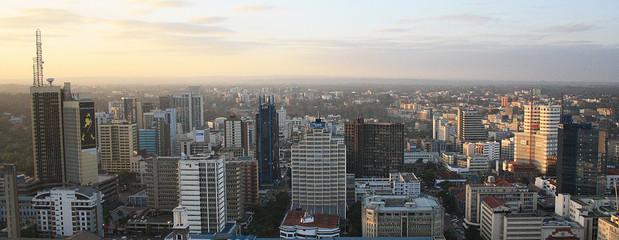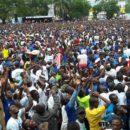Civil Society in Darfur: The Missing Peace
More than just a new development of Darfur’s volatile security situation, recent clashes in IDP camps highlight the very real and immediate impact of the peace process. Fighting between pro and anti SLA Abdul Wahid figures in Kalma camp (South Darfur) and Hamadiya camp (West Darfur) were kicked off by the aftermath of the last round of the Doha Civil Society meetings. While not the only factor in the violence, the first time participation of some IDPs from these camps, breaking the boycott on the process, inflamed tensions. The incident is an example of the complexities involved in the civil society process, and also of the political changes underway in Darfur, in this case abetted by international mediation driving the civil society process. Some of these challenges are outlined in our recent report Civil Society in Darfur: The Missing Peace published by the United States Institute of Peace.
It has become received wisdom that achieving lasting peace in Darfur requires more from a peace process than that which yielded the Darfur Peace Agreement (DPA) in 2006. Mediators and diplomats have long paid lip service to the idea of involving “˜civil society’ as part of a more “˜inclusive’ peace process. Over the last year however, this has become more of a reality, as the African Union/United Nations Joint Mediation Support Team (JMST) has toiled to operationalise into the Darfur peace process what was previously a somewhat vague concept. Civil society is now arguably the main event.
A strong civil society track to the peace process, previously seen by many as a rather fluffy – if well-meaning – goal, now has increasingly clear practical uses. First, it can be a vehicle for bringing crucial constituencies into the process, particularly where the recognised leaders of these constituencies are either excluded or intransigent. Fur IDPs and Abbala nomads are two groups whose buy-in is essential if a peace deal is to be respected. Neither have leaders that are representing them in the current “˜Track 1′ process. Bringing influential individuals from these groups into the civil society talks is – as demonstrated by the clashes in Kalma and Hamadiya – a difficult task, but one that remains essential.
Non-combatants also need to be involved in discussions of some of Darfur’s thornier issues, particularly issues of land, displacement and return, which cannot be resolved by rebel and government representatives alone. Moreover, a civil society bloc has the potential to generate momentum and positively pressure the existing Track 1 actors to engage, and to ensure popular buy-in and legitimacy for an eventual agreement.
However, though the Civil Society process remains nascent, some of the challenges it throws up are already evident. Firstly, participation in the process remains controversial and divisive among some communities in Darfur, communities that are essential for the process’s success. Many Fur IDP sheikhs loyal to Abdul Wahid’s faction of the Sudan Liberation Army refuse to participate in any peace process, following the rejectionist line of their leader. This may be in the process of changing though with some signs of growing support for the Doha process even amongst IDPs previously loyal to SLA-Abdul Wahid.
Second, other communities – namely the Abbala Arabs – remain outside the process more because of their pariah status than from their own choosing. Engaging with these groups, historically associated with the Janjaweed, is necessary for peace. But there is precious little knowledge of them amongst international actors. Mapping and contacts are missing. Moreover, the necessary engagement between these groups and other communities in Darfur, is still a bridge too far for some communities.
Thirdly, how the rebel groups relate to the process is unclear. Historically more open to engaging with civil society than the government, they are increasingly struggling to maintain their positions as spokesmen for the people of Darfur. Finally, there is the challenge of coordination amongst the international community. With the greater attention on civil society has come the attendant competition amongst international actors, which must be put aside in the interest of the process’ success. There is – as is common in Sudan – a lack of coordination and clear leadership among the international players (JMST, UNAMID, African Union High-Level Implementation Panel, US Government). This uncertain stewardship trickles down to the civil society players, sowing confusion as to who is in charge and where the process is going.
The Government of Sudan’s recent “New Strategy” took note of those international divisions. Without dismissing any of those foreign partners, it echoes AUHIP’s idea of “domesticating” the peace process, meaning relocating it to Sudan. With a commitment to an “extensive internal process”, including the creation of a “Darfur Consultative Forum”, to “complete” the two Doha civil society conferences, the strategy gives more space to civil society. But the danger in domestication is to exclude some key players, in particular those IDPs who were already boycotting Doha, not to mention the Darfur refugees in Chad, some of whom had joined the second Civil Society Conference in Doha. As with the Doha Civil Society process the role of the rebels is unclear. Moreover, the government’s intention to include Darfur’s newly elected officials into the peace process, understandable in the post-elections context, poses a risk to the process’s fragile equilibrium.
Civil society involvement in the peace process is a necessity, but it is vital that international mediators as well as national actors focus on “˜doing it right’ rather than “˜doing it quickly’. Getting civil society right is far more important than rushing it to an artificial deadline driven by the government-rebel negotiations or by the South Sudan referendum. The process of selection of civil society participants is nearly as important as the results of the discussions in which they are involved. If civil society participants are rejected by the population as unrepresentative, the process will be seen as illegitimate. Civil society must be engaged and selected with care, diplomacy and based on a sound understanding of local political and social fault lines. Not only do the Kalma and Hamadiya incidents show that Darfuri “˜civil society’ is subject to influence by various armed and political parties. They also remind international mediators that civil society, often idealised as a neutral arena for building consensus, can easily become a site of new divisions. There are dangers in ignoring the delicacy required of this process.







I enjoyed reading the essay of Theo Murphy and Jerome Tubiana, but I have some questions and then some comments.
First my questions:
How is the UN trying to operationalize civil society into the Darfur peace process? Is civil society merely being used for consultations? It may still be unclear as to the nature of the Civil Society Track and the nature of that track will determine its practicality in Doha.
Civil Society can bring constituencies to the table, but in what capacity? – Certainly not as negotiators?
It is without a doubt that the needs and concerns of non-combatants need to be, and should be, considered. The question becomes: Who will consider those concerns? Who are the decision makers in this process?
And now my comments:
To say that the civil society block can apply positive pressure to Track 1 participants sounds very much like the old “blame and shame” tactic. This tactic is considered by many to be ineffectual.
The difficulties in identifying and bringing all parties to the table are very real. This needs to be done in the sense of bringing all concerns and needs to the table. But it is the Track 1 group of participants who will be the decision makers and it is likely that the concerns and needs of the various civil society groups will be bargained and traded between the Track 1 participants like so many “chips” on a board game. The Track 1 groups will never surrender their claims to being the “legitimate voice of The People.” This then leads to competition over access to the podium; which in turn leads to a lack of clarity as to who actually is the leadership; and eventually to a lack of leadership itself.
AUHIP has suggested the domestication of the peace process, and the GOS has embraced that idea. Domestication of the peace process will probably lead to the exclusion of some stakeholders, but as the three track process is currently progressing it is a very real possibility that in the end, the concerns of some stakeholders will be excluded.
Participation by civil society is a necessity, but it is the nature of that participation that needs to be made clear. All stakeholders need to be made visible – and this could be a function of civil society. The needs and concerns of all stakeholders need to be given voice – and civil society can be that voice.
Murphy and Tubiana say that it is more important to get civil society right than to rush to an artificial deadline, and I believe that this is right in part. There need be no rush to some artificial deadline, but if by “getting Civil Society right” the authors mean credentialing certain civil society groups and discounting others, then it creates a marketplace of legitimacy where the currency will be political strength and political will. The process of selecting civil society participants begs the advancement of the agendas of the various Track 1 participants and the international parties who see themselves as stakeholders. Murphy and Tubiana suggest that “the population” will be the ultimate judge of the legitimacy of the various civil society participants. But what is termed: “the population” will be too difficult to identify and define in a specific enough manner so as to create a process that legitimizes participants. And if the fingerprints of international interest groups are likely to cloud the process, might it not be better to heed the suggestion of AUHIP and allow the process to be domestic?
It is warned that “Civil society must be engaged and selected with care, diplomacy and based on a sound understanding of local political and social fault lines.”
There are those who do not believe that a domestic process would ensure that civil society would be engaged and selected with care and diplomacy, but a domestic process would best ensure a sound understanding of local and political fault lines. And starting with that understanding, perhaps there could be constructed some process that could ensure the incorporation of care and diplomacy. Because of this, civil society may wish to consider AUHIP’s suggestion and weigh the value of participating in a domestic peace process.
Joint Response to Oscar Blayton and Theo Murphy/Jerome Tubiana
How very true your observations are Oscar. You left very little to be desired in a sound critique of the “Process” component of the “Gathering Process” of the National Stakeholders for the “Political Settlement Process” and the distinction between Track I and Track II.
The mix up may have resulted from the lack of professional capacity and awareness of “Tools” needed to design and manage a robust Process. Over simplification of the inputs needed to drive the process may be another factor. Damaging interventions by regional actors and bankruptcy of Mediation and their need for action-any action, may have been a contributing factors as well.
The New GOS Strategy may have created a new reality that can not be sidelined. Negotiation has become “an” element of many in GOS’s Strategy. If you read our Centre’s (Subsahara Centre) two interviews with Dr. Ghazi Salahuddin (One already posted in the blog and one to come soon), you will see how serious GOS is about the Strategy. If they fail or succeed is another matter. The Strategy is now a reality that must be reckoned with. If GOS can avail the $2 billion pledged and have a time space of 6-8 months, the landscape in Darfur may very well change.
Can Mediation turn their failures into success by plugging gaps? Is that too late now? Shall they settle for a mere face-saving document that can “probably” be signed between GOS and LJM? Or can they (or others) have the wisdom and honesty to look at the foundational fault lines in the process and reform it?
“Civil Society” or better “Darfur Society” shall always remain “Secondary Stakeholder” and the rebel Movements and Political Formations shall always remain “Primary Stakeholders” in Conflict Semantics.
Tag Elkhazin
Theo and Jerome,
Why do Abbala Arabs still remain aloof? Do they not want peace and prosperity? Isn’t the whole process that of formation of a civil society? People are already tired of all the political humdrum and want nothing more than stability.
Mediators surely cannot be given the rights to choose and decide who comes or not. It is for a concensus to decide and ensure that the whole process of bringing stability in the form of governance is not derailed.
hydroxycloraquine https://plaquenilx.com/# hydroxychloroquine sulfate classification